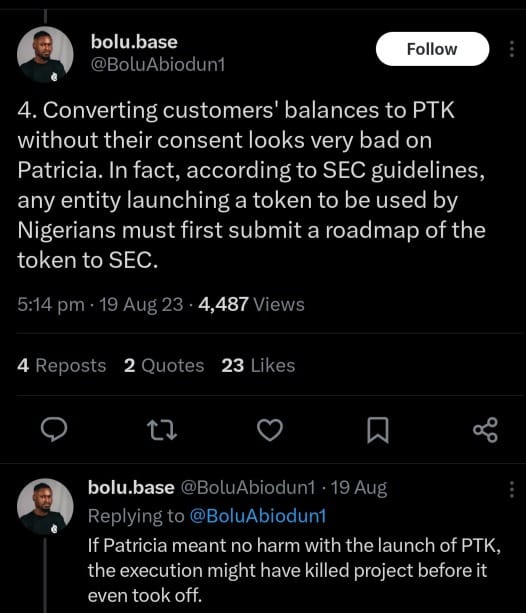The Role of Transparency in Communications: A Case Study of Patricia
Home to tech giants and unicorns like Flutterwave, Andela, and Paystack, Nigeria has been positioned as a major player in the tech ecosystem and a leading destination for startups and investors alike. As the Nigerian tech industry continues to grow and attract more attention, it becomes common for false and unverified information to be passed around as ‘news’, from time to time.
This trend emphasizes the need for effective public relations strategies that help to control narratives and dispel false news that might cause serious harm to a brand's reputation. Public Relations should not only be used as a reactive strategy but more proactively, to help businesses improve their brand image by taking control of their narratives, developing an impeccable brand image, and cultivating positive relationships with their stakeholders.
When businesses communicate transparently, they are better positioned to earn the trust of customers, investors, and other stakeholders even when things do not go as planned or mistakes are made.
Technology companies deal with different forms of crisis, ranging from security breaches to financial challenges, sudden changes in regulatory practices, unsatisfied customers, or disgruntled staff. When not managed properly, these crises can leave long-lasting negative effects on a brand’s reputation. With honest and open communication, however, businesses can retain a positive brand image even during a crisis.
Recently, Nigerian crypto startup Patricia faced accusations of being a Ponzi scheme and a rug-pull project after experiencing a security breach that caused user funds to be inaccessible. When faced with a situation like this, how can businesses effectively manage communication without losing customer trust or brand reputation?
Do not hide the truth
In times of crisis, transparency with stakeholders is essential. Though revealing difficult truths may seem difficult and risky, withholding information leaves a vacuum for speculation, lies and doubt to grow. Stakeholders may likely get the full story eventually - so it's better if they hear it directly from you first.
On May 26, 2023, Patricia announced that their crypto exchange platform had experienced a breach and as a result, suspended withdrawals. According to a Techcabal report, the hack originally took place in January 2022, however, perhaps to prevent panic among their users, the company kept this information private and attempted to manage the situation by freezing withdrawals, while allowing customers to deposit money on the platform. While users were unable to move their crypto coins into other wallets, Patricia offered to buy those coins and pay them in cash.
The announcement which was finally made about 16 months after the cyber attack originally happened, raised questions regarding the reason for the company’s silence.
Develop a crisis management strategy beforehand
Developing a crisis management strategy allows for clear communication and decisive action and gives you room to plan how to handle a crisis properly properly when it occurs.
Before the announcement of the hack, Patricia had announced the release of a new version of its app, Patricia Plus on May 11, 2023. This new version allowed customers to make withdrawals. However, as they began to move their crypto to other wallets, the company reinstated another freeze.
Then on the 19th of August 2023, Patricia announced the launch of its native tokens called Patricia Tokens (PTK) and went on to convert users' funds in crypto and fiat currencies to the said Patricia Tokens.
These series of events, although well-intentioned, may not have been properly planned out and executed, resulting in backlash for the company. According to Bolu Abiodun, a reporter at Techpoint Africa, “Converting customers’ balances to PTK without their consent looks very bad on Patricia.”

Take responsibility and communicate honestly
For financial institutions, your customers trust you with their money, and you are responsible for its protection and safekeeping. When a crisis prevents customers from accessing their funds, it is best to take responsibility for the problem and communicate the steps being taken to resolve it.
On November 24, 2023, the Nigerian Police Force through its X (Twitter) account, announced the arrest of a gubernatorial candidate, Wilfred Bonse in connection with the cyber attack. The arrest, which accounted for about $760,000 of the $2 million lost, helped vindicate the company and prove that the accusations of fraudulent activities were false.
Although the arrest helped restore the company’s brand image, transparent communication would have better preserved the company's reputation, maintained trust and mitigated damage amid the crisis.
Businesses need to realise that all stakeholders deserve authentic, genuine, and transparent communication. Customers and investors are veering toward brands that consider them important enough to create open communication channels. According to a 2023 Wimbart survey, 71.4% of investors will not invest follow-on funding in a startup failing to provide them with regular updates.
According to Kola Aina, Founding Partner at Ventures Platform, “In venture capital, investing in transparency is paramount, and consistent reporting is a sign of accountability. When startups regularly share their progress, challenges, and achievements, they are demonstrating a genuine commitment to transparency with investors.”
Transparency is an important aspect of communications which goes beyond announcing service downtimes or employee layoffs; it also requires open and honest communication, especially during a crisis.

